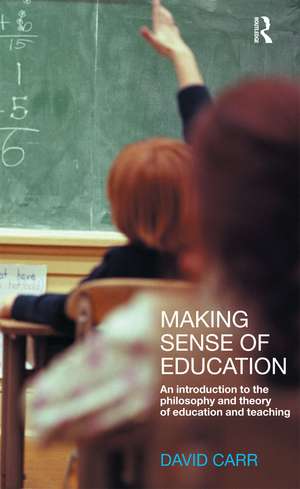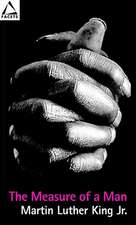Making Sense of Education: An Introduction to the Philosophy and Theory of Education and Teaching
Autor David Carren Limba Engleză Paperback – 12 sep 2002
The book is divided into three parts:
- education, teaching and professional practice: issues concerning education, the role of the teacher, the relationship of educational theory to practice and the wider moral dimensions of pedagogy
- learning, knowledge and curriculum: issues concerning behaviourist and cognitive theories of learning, knowledge and meaning, curriculum aims and content and evaluation and assessment
- schooling, society and culture: issues of the wider social and political context of education concerning liberalism and communitarianism, justice and equality, differentiation, authority and discipline.
| Toate formatele și edițiile | Preț | Express |
|---|---|---|
| Paperback (1) | 361.15 lei 6-8 săpt. | |
| Taylor & Francis – 12 sep 2002 | 361.15 lei 6-8 săpt. | |
| Hardback (1) | 1277.27 lei 6-8 săpt. | |
| Taylor & Francis – 12 sep 2002 | 1277.27 lei 6-8 săpt. |
Preț: 361.15 lei
Nou
Puncte Express: 542
Preț estimativ în valută:
69.11€ • 75.05$ • 58.06£
69.11€ • 75.05$ • 58.06£
Carte tipărită la comandă
Livrare economică 23 aprilie-07 mai
Preluare comenzi: 021 569.72.76
Specificații
ISBN-13: 9780415230742
ISBN-10: 0415230748
Pagini: 308
Ilustrații: black & white illustrations
Dimensiuni: 156 x 234 x 18 mm
Greutate: 0.57 kg
Ediția:New.
Editura: Taylor & Francis
Colecția Routledge
Locul publicării:Oxford, United Kingdom
ISBN-10: 0415230748
Pagini: 308
Ilustrații: black & white illustrations
Dimensiuni: 156 x 234 x 18 mm
Greutate: 0.57 kg
Ediția:New.
Editura: Taylor & Francis
Colecția Routledge
Locul publicării:Oxford, United Kingdom
Public țintă
Postgraduate and UndergraduateCuprins
Part I: Education, Teaching and Professional Practice 1. Education, Persons and Schooling 2. The Complex Character of Teaching 3. The Complex Role of the Teacher 4. Educational Theory and Practice 5. Wider Moral Implications of Education Part II: Learning, Knowledge and Curriculum 6. Learning: Behaviour, Perception and Cognition 7. Learning: Meaning, Language and Culture 8. Knowledge, Explanation and Understanding 9. Curriculum: Purpose, Form and Content 10. Curriculum: Process, Product and Appraisal Part III: Schooling, Society and Culture 11. Liberalism, Impartiality and Liberal Education 12. Community, Identity and Cultural Inheritance 13. Justice, Equality and Difference 14. Freedom, Authority and Discipline 15. Political Dimensions of Education
Recenzii
'As Carr says, without responsible professional reflection there is not much hope, either for teaching or democracy. But teachers already committed to such reflection will find real value in what he says and in his conclusions. And there's an excellent glossary.' - Michael Duffy, TES
'A tour de force of analytic discrimination, it is testimony to the necessity for plain prose and careful argument in educational discourse.' - Theory and Research in Education
'As Carr says, without responsible professional reflection there is not much hope, either for teaching or democracy. But teachers already committed to such reflection will find real value in what he says and in his conclusions. And there's an excellent glossary.' - Michael Duffy, TES
'I would recommend this book for any Masters programme in Education. It provides an overview and useful starting point for further, more in-depth study. It is, perhaps, of particular use to non-philosophers as it gives an insight to the complexity and influence of the discipline in education throughout the centuries.' - Chris Smith, Escalate
'A tour de force of analytic discrimination, it is testimony to the necessity for plain prose and careful argument in educational discourse.' - Theory and Research in Education
'This book grew on me as I waded into its deeper waters ... This is a substantial work offering a rich resource particularly for the more advanced student and represents a very useful addition to the field.' - Andrew Davis, British Journal of Educational Studies
'Ultimately this book is quite unique and is a worthy addition to any university bookshelf. It should be a key text for Initial Teacher Education.' - John Dakers, Scottish Educational Review
'A tour de force of analytic discrimination, it is testimony to the necessity for plain prose and careful argument in educational discourse.' - Theory and Research in Education
'As Carr says, without responsible professional reflection there is not much hope, either for teaching or democracy. But teachers already committed to such reflection will find real value in what he says and in his conclusions. And there's an excellent glossary.' - Michael Duffy, TES
'I would recommend this book for any Masters programme in Education. It provides an overview and useful starting point for further, more in-depth study. It is, perhaps, of particular use to non-philosophers as it gives an insight to the complexity and influence of the discipline in education throughout the centuries.' - Chris Smith, Escalate
'A tour de force of analytic discrimination, it is testimony to the necessity for plain prose and careful argument in educational discourse.' - Theory and Research in Education
'This book grew on me as I waded into its deeper waters ... This is a substantial work offering a rich resource particularly for the more advanced student and represents a very useful addition to the field.' - Andrew Davis, British Journal of Educational Studies
'Ultimately this book is quite unique and is a worthy addition to any university bookshelf. It should be a key text for Initial Teacher Education.' - John Dakers, Scottish Educational Review
Notă biografică
David Carr is Professor of Philosophy of Education at the University of Edinburgh. He is author of Educating the Virtues (Routledge 1991), Professionalism and Ethical Issues in Teaching (Routledge 2000) and of numerous philosophical and educational articles.
Descriere
David Carr's new text for undergraduates and postgraduates of the philosophy of education seeks to enhance and expand - and in some cases argue against - the discussions arising from the post-war revolution in the subject.














